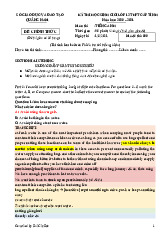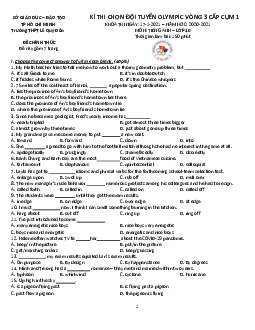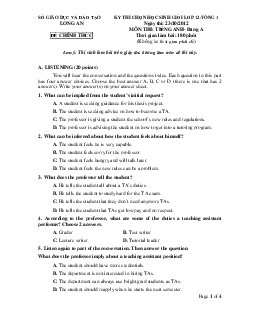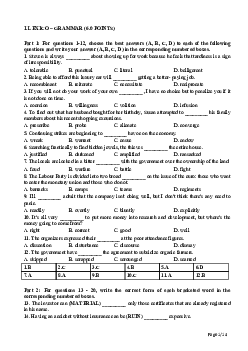






Preview text:
SỞ GIÁO DỤC VÀ ĐÀO TẠO
KỲ THI CHỌN HỌC SINH GIỎI THPT CẤP TỈNH SÓC TRĂNG Năm học 2019-2020
¯¯¯¯¯¯¯¯¯¯¯¯
¯¯¯¯¯¯¯¯¯¯¯¯¯¯¯¯ ĐỀ CHÍNH THỨC Môn: TIẾNG ANH
(Thời gian làm bài 180 phút, không kể thời gian phát đề) (Đề thi này có 07 trang)
- Thí sinh làm bài trên giấy làm bài.
- Thí sinh làm phần nghe hiểu trước.
A. Listening. (3.6 points)
Part 1. You will hear people talking in eight different situations. For questions 1-8, choose the
best answer A, B or C. (1.6 points)
1. You hear the beginning of a lecture in a university. What is the lecture going to be about? A. the history of a place B. social problems C. a person’s life and work
2. You hear part of a radio programme about an island. Why are there so few trees on the island now?
A. because of urban development
B. because of the expansion of agriculture
C. because of the action of the sea
3. You hear a teenage boy talking on the radio about his family’s efforts to earn money. What will the money be used for? A. computer games B. new clothes C. an expensive car
4. You hear an announcement at a railway station. What should you do if you want to go to London?
A. await further instructions
B. travel from a different platform
C. get on the next train to arrive
5. You hear a man talking about newspapers. What does he say about the newspaper he reads?
A. It is an essential part of life.
B. It is an important source of information.
C. It is useful for passing the time.
6. You hear a conversation on the radio. What is the programme about?
A. solving traffic problems in cities
B. studying nature and wildlife
C. finding part of an ancient town
7. You hear two people talking about a music festival they have been to. What do they agree about?
A. the quality of the performances B. the fairness of the prices
C. the standard of the accommodation
8. You hear a travel writer speaking on a radio programme. What aspect of his travels is he talking about?
A. what he does to keep healthy
B. how he reduces the risk of accidents
C. illnesses from which he has suffered
Part 2: You will hear a radio interview with Mike Reynolds, whose hobby is exploring 1
underground places such as caves. For questions 9 – 18, complete the sentences. (2.0 points)
Cavers explore underground places such as mines and (9) _______ as well as caves.
When cavers camp underground, they choose places which have space and (10) ______ available.
In the UK, the place Mike likes best for caving is (11) _______.
As a physical activity, Mike compares caving to (12) _______.
Cavers can pay as much as £20 for a suitable (13) _______.
Cavers can pay as much as £50 for the right kind of (14) _______, which is worn on the head.
Mike recommends buying expensive strong boots to avoid having (15) _______.
Caving is a sport for people of all ages and (16) _______.
Some caves in Britain are called “places of (17) ________”.
The need for safety explains why people don’t (18) ________ caving competitions.
B. Lexico – Grammar. (5.8 points)
Part 1. Choose the best option to complete each sentence. (1.2 points)
1. The rapid growth of population led to an acute ______ of housing. A. shortcut B. shortage C. shortfall D. shortcoming
2. In Britain Christmas dinner usually ______ turkey, Christmas pudding and brandy butter. A. consists of B. serves with C. puts up D. brings on
3. The first village _______ was not far from my city.
A. where I visited B. that I visited to C. to which I visited D. I visited
4. Large amounts of dangerous waste are _______daily by the factories. A. brought B. come C. discharged D. survived
5. The bracelet was _______ with her name and date of birth. A. undertaken B. drawn C. based D. engraved
6. This is a picture of a _______ bus.
A. London bright red B. bright red London C. red bright London D. London red bright
Part 2. Choose the correct verb tense or form. (1.0 point)
1. Marine biologists are concerned about the effect of untreated sewage _____ into coastal waters. A. to flow B. flowing C. flows D. flown
2. If I had met you last Sunday, I ______ here today. A. wouldn’t be B. wouldn’t have been C. had been D. would have been
3. Now they regret _______ their son by providing too many material possessions.
A. having been spoiled B. to have been spoiled C. to have spoiled D. having spoiled
4. - Peter: “this silver vase is tarnished.”
- Scott: “In my opinion, it needs ________. A. to be polish B. polished C. polishing D. being polished
5. _______ to get through to Michel for days now. Either she’s away or her phone’s out of order. A. I’m trying B. I had tried C. I’ve been trying D. I tried
Part 3. The passage below contains 8 mistakes. Find and correct them in your answer sheet. (1.6 points) 2
(0) Line 1 has been done as an example
Most of the joggers who are overweigh are (0) Line 1. overweigh → overweight
reasonable for talking about, worrying on, and being (1) Line --. ----- → ______
obsessed with their weight. Since many people start (2) Line --. ----- → ______
jogging to lose weight, it is not surprised that body size (3) Line --. ----- → ______
is importance. More and more people are on a diet. 50% (4) Line --. ----- → ______
of the women and approximately 25% of the men in the (5) Line --. ----- → ______
US are watching what they eat. Body weight is the (6) Line --. ----- → ______
second most talk between joggers – heart disease and (7) Line --. ----- → ______
high bleeding pressure are the first! There are many (8) Line --. ----- → ______
factors that affect your weight. They include: body type,
diet, exercise level, sex and age. What may be an
“ideal” weight for you in the age of 27 may not be ideal
while you’re 54. And your ideal weight will probably be
different during racing season when you were in a specific training phase.
Part 4. Mark the letter A, B, C or D to indicate the word or phrase that is CLOSEST in
meaning to the underlined part. (0.4 point)
1. People in this region cultivate mainly rice and vegetables. A. develop B. support C. destroy D. grow
2. His uncle, who is an accomplished guitarist taught me how to play. A. skillful B. perfect C. modest D. famous
Part 5. Mark the letter A, B, C or D to indicate the word OPPOSITE in meaning to the
underlined word. (0.4 point)
1. The hotel was incredible with breathtaking view and excellent cuisine. A. untouched B. unimpressive C. unspoiled D. unadorned
2. On Saturday wearing uniform is optional so I often choose T-shirt. A. acceptable B. uncomfortable C. compulsory D. voluntary
Part 6. Complete each sentence with a word formed from the word in brackets. (1.2 points)
1. - “What are they talking about?” - “They are discussing problems ______ the budget.” (CONCERN)
2. The main threat to the ______ of these creatures comes from their loss of habitat. (SURVIVE)
3. His work brought him fame, but little ______ reward. (MONEY)
4. We should arrive three days early in order to ______. (CLIMATE)
5. The bride was ______ dressed in white. (STYLE)
6. The athlete ______ decided to aim for five gold medals. (AMBITION)
C. Reading (5.6 points)
I. Read the passage and use ONLY ONE suitable word to fill in each gap. (2.0 points)
In a village on the south coast of Taiwan, people were waiting for news. Two of fishing-
boats had (1) ____ caught in the storm which had blown up during the night. In the cottages round 3
the harbor people stood by their doors too worried to talk.
The rest of the fishing fleet had (2) _____ the harbor before dark, and the men from these
(3) ____ waited and watched with the wives and families of the missing men. Some had brought
thick blankets and some flasks of hot drinks, knowing that the men (4) ______ be cold and tired.
When dawn began to break over in the south, a small point of (5) ____ was seen in the darkness of
the water and a few minutes later, (6) ______ was a shout.
(7) _______ long, the two boats were turning in, past the lighthouse, to the inside of the
harbor. The men were helped (8) ____ of their boats, and (9) ______ they were stiff with cold and
tiredness, they were all (10) ________.
II. Read the following passage and choose the letter A, B, C or D to indicate the correct
answer to each of the questions. (1.6 points) PANDEMIC DISEASES
Diseases are a natural part of life on earth. If there were no diseases, the population would
grow too quickly, and there would not be enough food or other resources, so in a way, diseases are
natural ways of keeping the Earth in balance. But sometimes they spread very quickly and kill large
numbers of people. For example, in 1918, an outbreak of the flu across the world killed over 25
million people only in six months. Such terrible outbreaks of a disease are called pandemics.
Pandemics happen when a disease changes in a way that our bodies are not prepared to
fight. In 1918, a new type of flu virus appeared. Our bodies had no way to fight this new flu virus,
and so it spread very quickly and killed large numbers of people. While there have been many
different pandemic diseases throughout history, all of them have a new thing in common.
First, all pandemic diseases spread from one person to another very easily.
Second, while they may kill many people, they generally do not kill people very quickly. A
good example of this would be the Marburg virus. The Marburg virus is an extremely infectious
disease. In addition, it is deadly. About 70%-80% of all people who get the Marburg virus die from
the disease. However, the Marburg virus has not become a pandemic because most people die
within three days of getting the disease. This means that the virus does not have enough time to
spread a large number of people. The flu virus of 1918, on the other hand, generally took about a
week to ten days to kill its victims, so it had more time to spread.
While we may never completely stop pandemics, we can make them less common. Doctors
carefully monitor new diseases that they could become pandemics. For example, in 2002 and 2003,
doctors carefully watched SARS. Their health warning may have prevented SARS from becoming a pandemic.
1. This passage is mainly about _____.
A. how to prevent pandemic diseases B. pandemic diseases C. pandemic diseases nowadays
D. pandemics that happened in the 20th century
2. According to paragraph 1, how are diseases a natural part of life on Earth? A. They prevent pandemics B. They kill too many people
C. They led the world grow quickly
D. They help control the population
3. According to the passage, what causes pandemics?
A. Changes in a disease that the body cannot fight.
B. Careless doctors who do not watch the spread of diseases.
C. Population growth that the world cannot support.
D. The failure to make new medicines
4. According to the passage, all of the following are true of the 1918 flu pandemic EXCEPT that 4 ____.
A. it involved a new kind of flu virus
B. it killed over 25 million people
C. it was the last pandemic in history
D. it took a little over a week to kill its victims
5. The word “it” in the passage refers to _____. A. disease B. flu virus C. pandemics D. bodies
6. Which of the following is mentioned as a common feature of all pandemic diseases?
A. They spread from people to people very quickly.
B. It kills many people very quickly.
C. They do not kill people very quickly. D. They kill all the victims.
7. The word “monitor” in the passage is closest in meaning to _____. A. watch B. fight C. prevent D. avoid
8. The author mentions SARS in order to _____.
A. give an example of a highly dangerous disease
B. suggest that SARS will never become a pandemic
C. suggest that there may be a new pandemic soon
D. give an example of the successful prevention of a pandemic
III. Read the following passage and choose the letter A, B, C or D to indicate the correct
answer to each of the questions. (2.0 points)
Harvard University, today recognized as part of the top echelon of the world’s universities,
came from very inauspicious and humble beginnings.
This oldest American university was founded in 1636, just 16 years after the pilgrims landed
at Plymouth. Included in the Puritan emigrants to the Massachusetts colony during this period were
more than 100 graduates of England’s prestigious Oxford and Cambridge universities, and these
university graduates in the New World were determined that their sons would have the same
educational opportunities that they themselves had had. Because of this support in the colony for an
institution of higher learning, the General Court of Massachusetts appropriated 400 pounds for a
college in October of 1636 and early the following year decided on a parcel of land for the school –
this land was in an area called Newetowne, which was later renamed Cambridge after its English
cousin and is the site of the present day university.
When a young minister named John Harvard, who came from the neighbouring town of
Charlestowne, died from tuberculosis in 1638, he willed half of his estate of 1,700 pounds to the
fledgling college. In spite of the fact that only half of the bequest was actually paid, the General
Court named the college after the minister in appreciation for what he had done. The amount of
bequest may not have been large, particularly by today’s standards, but it was more than the
General Court had found it necessary to appropriate in order to open the college. Henry Dunster
was appointed the first president of Harvard in 1640, and it should be noted that in addition to
serving as president, he was also the entire faculty with an entering freshman class of four students.
Although the staff did expand somewhat, for the first century of its existence the entire teaching
staff only consisted of the president and three or four tutors.
1. The main idea of this passage is that ____.
A. a great university today started out from a small one
B. John Harvard was key to the development of a great university
C. Harvard is not one of the world’s most prestigious universities
D. Harvard University developed under the auspices of the General Court of Massachusetts 5
2. The passage indicates that Harvard is ____.
A. one of the oldest universities in South America B. one of the oldest universities in Europe
C. the oldest university in America
D. the oldest university in the world
3. It can be inferred from the passage that the Puritans who traveled to the Massachusetts colony were ____. A. rather rich B. rather well educated C. rather undemocratic
D. rather supportive of the English government
4. The pronoun “they” in paragraph 2 refers to ____.
A. Oxford and Cambridge universities B. educational opportunities C. sons D. university graduates
5. The word “pounds” in paragraph 2 are probably ____. A. college students B. school campuses
C. units of money D. types of books
6. The word “English cousin” in paragraph 2 refers to ____. A. person B. city C. court D. relative
7. Which of the following is NOT mentioned about John Harvard? A. Where he came from
B. How much he bequeathed to Harvard C. What he died of D. Where he was buried
8. The word “fledgling” in paragraph 3 could best be replaced by which of the following? A. newborn B. winged C. flying D. established
9. The passage implies that ____.
A. someone else really served as president of Harvard before Henry Dunster
B. Henry Dunster spent much of his time as president managing the Harvard faculty
C. Henry Dunster was an ineffective president
D. the position of president of Harvard was not merely an administrative position in the early years.
10. The word “somewhat” in paragraph 3 could best be replaced by ____. A. back and forth B. side by side C. more or less D. to and fro
D. Writing (5.0 points)
Part 1. Complete the second sentence so that it has the same meaning as the first one. (1.0 point)
1. Don’t go to lunch until you have typed all these letters.
* Make sure you finish ......................................................................................................................
2. Tracey didn’t inherit anything under her aunt’s will.
* Tracey’s aunt didn’t ........................................................................................................................
3. I dislike it when people criticize me unfairly.
* I object .............................................................................................................................................
4. Henry regrets buying that second-hand car.
* Henry wishes ……...........................................................................................................................
5. You may get hungry on the train, so take some sandwiches.
* In …………….................................................................................................................................
Part 2. Rewrite each sentence below so that its meaning stays the same. Use the word given in
brackets without changing it. (1.0 point)
1. Jack’s doctor advised him not to watch so much TV. (SAID) 6
* “If I were ............................................................................................................................... to him.
2. The decorators have finished the whole of the first floor. (HAD)
* We …………....................................................................................................................................
3. It’s unusual for Amy to get angry with her staff. (HARDLY)
* Amy .................................................................................................................................................
4. His company didn’t decide to replace his model. (INTENTION)
* His company ....................................................................................................................................
5. The two theories appear to be completely different. (COMMON)
* The two theories ..............................................................................................................................
Part 3. Writing (3.0 points)
Write a composition (180 – 200 words) about the following topic.
Some people believe that a college or university education should be available to all
students. Others believe that higher education should be available only to good students.
Discuss these views. Which view do you agree with? Explain why.
* Note: Don’t write your name or your school’s name. —The End—
Họ tên thí sinh:........................................................................Số báo danh:........................................
Chữ ký của Giám thị 1: .......................................... Chữ ký của Giám thị 2:....................................... 7




